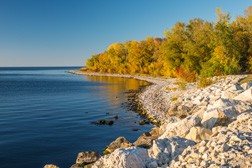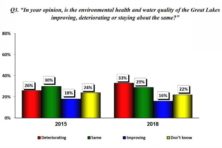Great Lakes Get Bipartisan Support
- Share
- Tweet
- Pin
- Share

A survey by the Healing Our Waters Coalition revealed that 65 percent of Wisconsin residents feel that federal funding for the restoration and protection of the Great Lakes should continue.
We can’t seem to agree on rights for public employees, providing public healthcare services or mining regulations, but Wisconsinites can agree on this: funding for Great Lakes restoration projects should continue.
That’s what a recent Healing Our Waters Coalition survey found.
“We really think it’s pretty clear that the people of Wisconsin value the Great Lakes, and they want to see our public officials at the highest levels of office take care of them,” said Jordan Lubetkin, communications manager for Healing Our Waters and the National Wildlife Federation’s Great Lakes regional center. “That’s why we think it’s important that both presidential candidates Mitt Romney and Barack Obama carry the torch with Great Lakes restoration.”
The Healing Our Waters Coalition is an organization of environmental and recreation groups that work to restore and protect the Great Lakes. The survey was conducted statewide and had 801 respondents.
The survey found that 65 percent of Wisconsinites think federal funding to The Great Lakes Restoration Initiative (GLRI) should continue. The GLRI has received federal funding since it was created in 2010 and received $300 million in 2012.
Those funds get spread around the basin to projects that address Great Lakes environmental issues. The Door County Soil and Water Conservation Department (DCSWCD) received GLRI funds to renovate beaches so that they filter stormwater before it runs into the lake, helping keep the beaches clean.
“It should increase tourism, it should increase beach usage, with fewer [beach] closures,” said Greg Coulthurst, conservationist at the DCSWCD. “Certainly people aren’t going to swim at a beach closed for E. coli.”
Coulthurst said people are supportive of the beach renovation, and municipalities are thankful that GLRI grants pay nearly 90 percent of the construction costs.
“I hope to god whatever party gets elected continues this effort,” Coulthurst said.
Although the majority of Republicans – 61 percent – said the GLRI should take its share of budget cuts, and the majority of Democrats – 67 percent – want funding to stay at $300 million, Lubetkin said Great Lakes get bipartisan support from Wisconsin residents.
“This should light a fire under both presidential candidates and members of Congress to keep a good thing going,” Lubetkin said.
Budget cuts aren’t the only Great Lakes decision the legislature faces. Asian carp, an invasive species of large fish whose voracious appetites could devastate local fisheries, have reached an electronic barrier in the Chicago Area Waterway System and are literally jumping at the opportunity to cross into Lake Michigan.
A federal court of appeals denied a request from Michigan, Wisconsin, Minnesota, Ohio and Pennsylvania that the U.S. Army Corps of Engineers and Metropolitan Water Reclamation District of Greater Chicago close the connection between Lake Michigan and the Chicago Area Waterway System.
But 60 percent of Wisconsinites support building a barrier to keep Asian carp out of Lake Michigan, even though it would keep large barges from crossing as well. A majority of Democrats, 61 percent, and Republicans, 53 percent, supported the barrier.
“The Great Lakes continue to be an issue that unites people instead of divides them,” Lubetkin said.

